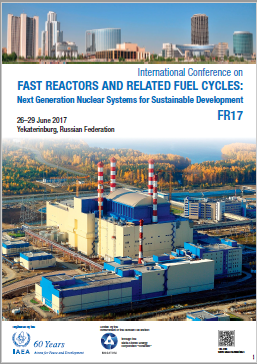Speaker
Dr
Alexander Sorokin
(Central Research Institute of Structural Materials “Prometey”)
Description
Fracture toughness and fracture strain of austenitic steels are the important performance properties, which control serviceability of the components of fast reactors including fuel assemblies. It is known that the above properties decrease under irradiation and thermal ageing. Especially strong decrease of fracture toughness occurs under irradiation accompanied by swelling. It is necessary to note that ductile transgranular fracture mechanism dominates at temperature less than 500 degrees Celsius even for highly embrittled material with high swelling. Such type of fracture can be predicted by the ductile fracture model proposed by authors early.
At the temperature higher than 500 degrees Celsius fracture of irradiated austenitic steels occurs by intergranular mode. Such embrittlement is known as high temperature radiation embrittlement (HTRE). There are only few experimental data on HTRE, and models are practically absent for prediction of fracture toughness and ductility for different levels of stress triaxiality.
The present work considers the features of prediction of fracture strain and fracture toughness for irradiated austenitic steels over wide range of temperatures with regard for swelling and thermal ageing. Model is developed for prediction of both quasi-brittle intergranular and ductile transgranular fracture and the fracture mechanisms transition. The model allows one to predict fracture strain and fracture toughness of material for different stress triaxiality taking into account the influence of neutron irradiation, swelling and grain boundary damage by He. The data are represented for fracture modeling of the material of decommissioned fuel assemblies.
Country/Int. Organization
Russia/ Central Research Institute of Structural Materials “Prometey”,
JSC “Institute of Nuclear Materials”,
Author
Dr
Alexander Sorokin
(Central Research Institute of Structural Materials “Prometey”)
Co-authors
Dr
Alexander Kozlov
(JSC “Institute of Nuclear Materials”)
Prof.
Boris Margolin
(Central Research Institute of Structural Materials “Prometey”)
Dr
Svetlana Barsanova
(JSC “Institute of Nuclear Materials”)

